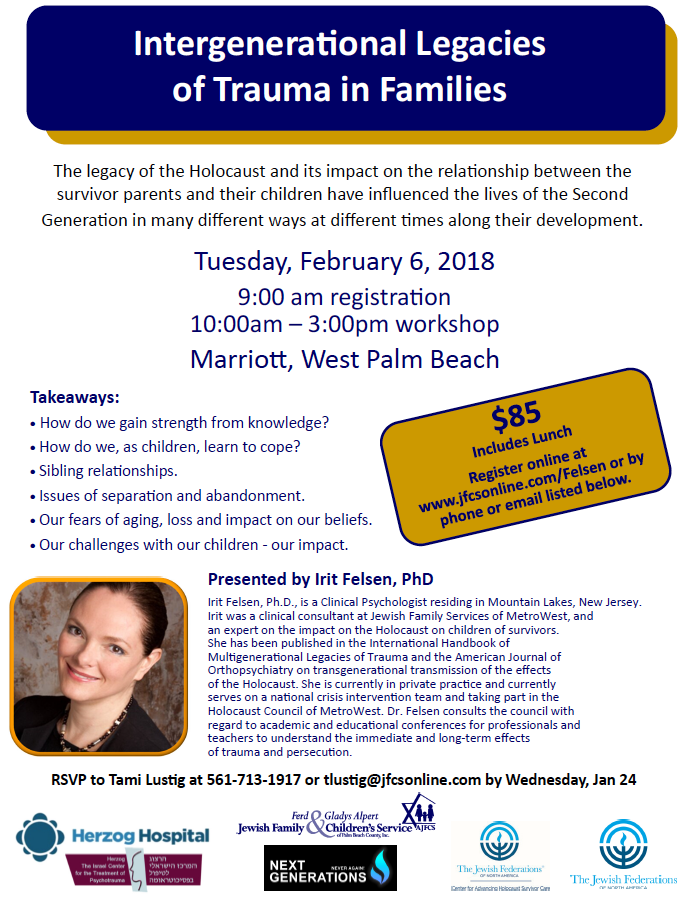On February 5th-6th, 2018, I will have the honor of presenting a professional training about trauma and aging for the Alpert Jewish Family and Children’s Service in West Palm Beach, Florida. The workshop will take place at the Marriot, West Palm Beach and is organized and supported by Herzog Israeli Center for Treatment of Psychotrauma; Next Generations; The Jewish Federations of North America Center for Advancing Holocaust Survivor Care.
The first day of the workshop will consist of professional training sessions for the staff, while the second day is a workshop for second generation and family members of Holocaust survivors. Registration and other information about the public workshop on the second day is presented in the flyer displayed below.
 Much of what is known about the intergenerational transmission of effects related to parental trauma is based on the vast body of studies and observations related to the children of Holocaust survivors, which by now span an entire lifetime, manifesting the way the so-called “Second Generation” navigated important life transitions and challenges from adolescence through adulthood. The knowledge that has accumulated about the impact of a legacy of trauma in the family shows that there are significant effects on the relationships between children and survivor parents as well as among siblings, and long-reaching effects on later relationships of the children of survivors with spouses/partners and with their own children. This accumulation of knowledge that led to the recognition of “historical trauma” has implications for many other populations exposed to extreme and prolonged traumatic experiences. This workshop aims at increasing the knowledge understanding of trauma, its immediate and in particular, its long-term effects, and increase familiarity with the symptoms and signs of it in individuals, especially in elderly individuals, as well as in staff.
Much of what is known about the intergenerational transmission of effects related to parental trauma is based on the vast body of studies and observations related to the children of Holocaust survivors, which by now span an entire lifetime, manifesting the way the so-called “Second Generation” navigated important life transitions and challenges from adolescence through adulthood. The knowledge that has accumulated about the impact of a legacy of trauma in the family shows that there are significant effects on the relationships between children and survivor parents as well as among siblings, and long-reaching effects on later relationships of the children of survivors with spouses/partners and with their own children. This accumulation of knowledge that led to the recognition of “historical trauma” has implications for many other populations exposed to extreme and prolonged traumatic experiences. This workshop aims at increasing the knowledge understanding of trauma, its immediate and in particular, its long-term effects, and increase familiarity with the symptoms and signs of it in individuals, especially in elderly individuals, as well as in staff.
Finally, the workshop will discuss recent insights from neuroscience about processes involved in dehumanizing perceptions of others, their origin in evolutionary psychology, and the evidence for prevalence of dehumanization in modern medical settings. The presentation aims at education those working with trauma survivors and their families to know about the risk for dehumanization of elderly patients, especially of elderly trauma survivors, in medical settings and at increase ability among well-intentioned healthcare providers to self-regulate non-conscious bias and prevent re-traumatization of those who had already experienced malignant cruelty and aggression.
Irit Felsen

Leave a Reply